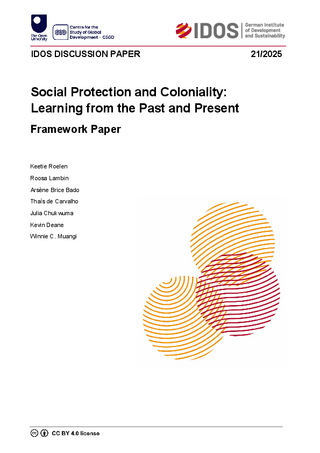Social protection and coloniality: learning from the past and present: framework paper
Roelen, Keetie / Roosa Lambin / Arsène Brice Bado / Thaís de Carvalho / Julia Chukwuma / Kevin Deane / Winnie C. MuangiDiscussion Paper (21/2025)
Bonn: German Institute of Development and Sustainability (IDOS)
ISBN: 978-3-96021-266-9
DOI: https://doi.org/10.23661/idp21.2025
The historical influence of colonial powers and the continued, deep-rooted engagement of international development actors in shaping social protection systems is widely recognised across academic and policy arenas. Nevertheless, evidence of the role of coloniality in social protection remains limited. This Discussion Paper explores the enduring impact of colonialism on contemporary social protection systems by considering the role of coloniality in social protection in the Global South, and Africa in particular. It does so by employing a three-fold methodology, namely (i) an examination of empirical and theoretical literature, including scholarship on coloniality, policy transfers and political settlements in the realm of social protection, among other topics; (ii) semi-structured interviews with international and regional stakeholders from academia, civil society and international organisations; and (iii) country case studies in Côte d’Ivoire and Tanzania.
The paper proposes a “social protection and coloniality” analytical framework to allow for analysing and unpacking the role of coloniality in social protection. It zooms in on three key components through which coloniality in social protection is manifested, resisted or countered: (i) colonial legacies, (ii) postcolonial influences and (iii) domestic political economy factors. This framework provides a novel lens to examine historical path dependencies and pathways that have shaped and continue to influence contemporary social protection systems in the Global South. It enables the identification of context- and country-specific issues, bringing them to the forefront while emphasising enduring colonial footprints and their interplay with domestic factors.
Findings suggest that colonial legacies and postcolonial influences continue to shape social protection across Africa, as moderated by domestic political economy factors. It advocates for more equitable partnerships and critical reflection among international actors. The paper also calls for stronger integration of local knowledge to support country-driven social protection frameworks. By addressing these challenges and promoting context-specific solutions, it is possible to develop social protection systems that are more home-grown and less reliant upon external influences.

